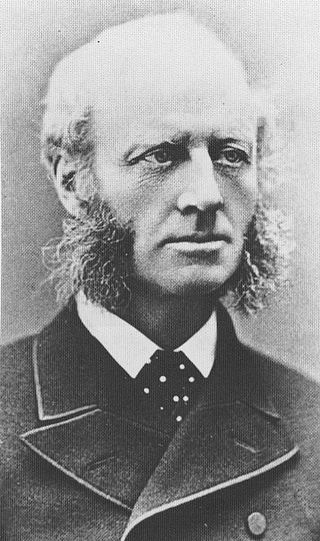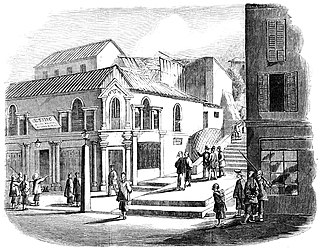
The First Sino-Japanese War, or the First China–Japan War, was a conflict between the Qing dynasty of China and the Empire of Japan primarily over influence in Korea. In Chinese it is commonly known as the Jiawu War. After more than six months of unbroken successes by Japanese land and naval forces and the loss of the ports of Lüshunkou and Weihaiwei, the Qing government sued for peace in February 1895 and signed the unequal Treaty of Shimonoseki two months later, ending the war.

The First Opium War, also known as the Anglo-Chinese War, was a series of military engagements fought between the British Empire and the Qing dynasty of China between 1839 and 1842. The immediate issue was the Chinese enforcement of their ban on the opium trade by seizing private opium stocks from mainly British merchants at Guangzhou and threatening to impose the death penalty for future offenders. Despite the opium ban, the British government supported the merchants' demand for compensation for seized goods, and insisted on the principles of free trade and equal diplomatic recognition with China. Opium was Britain's single most profitable commodity trade of the 19th century. After months of tensions between the two states, the Royal Navy launched an expedition in June 1840, which ultimately defeated the Chinese using technologically superior ships and weapons by August 1842. The British then imposed the Treaty of Nanking, which forced China to increase foreign trade, give compensation, and cede Hong Kong Island to the British. Consequently, the opium trade continued in China. Twentieth-century nationalists considered 1839 the start of a century of humiliation, and many historians consider it the beginning of modern Chinese history.

The Second Opium War, also known as the Second Anglo-Chinese War or Arrow War, was fought between the United Kingdom and France against the Qing dynasty of China between 1856 and 1860. It was the second major conflict in the Opium Wars, which were fought over the right to import opium to China, and resulted in a second defeat for the Qing Mandate and the forced legalization of the opium trade. It caused many Chinese officials to believe that conflicts with the Western powers were no longer traditional wars, but part of a looming national crisis.

In international law, extraterritoriality or exterritoriality is the state of being exempted from the jurisdiction of local law, usually as the result of diplomatic negotiations.

The Tongzhi Emperor, also known by his temple name Emperor Muzong of Qing, personal name Zaichun, was the tenth emperor of the Qing dynasty, and the eighth Qing emperor to rule over China proper. His reign, which effectively lasted through his adolescence, was largely overshadowed by the rule of Empress Dowager Cixi. Although he had little influence over state affairs, the events of his reign gave rise to what historians call the "Tongzhi Restoration", an unsuccessful modernization program.

The Qianlong Emperor, also known by his temple name Emperor Gaozong of Qing, personal name Hongli, was the sixth emperor of the Qing dynasty and the fourth Qing emperor to rule over China proper. He reigned officially from 1735 until his abdication in 1796, but retained ultimate power subsequently until his death in 1799, making him one of the longest-reigning monarchs in history as well as one of the longest-lived.

Sir Harry Smith Parkes was a British diplomat who served as Envoy Extraordinary and Minister Plenipotentiary and Consul General of the United Kingdom to the Empire of Japan from 1865 to 1883 and the Chinese Qing Empire from 1883 to 1885, and Minister to Korea in 1884. Parkes Street in Kowloon, Hong Kong is named after him.

Impressment, colloquially "the press" or the "press gang", is a type of conscription of people into a military force, especially a naval force, via intimidation and physical coercion, conducted by an organized group. European navies of several nations used impressment by various means. The large size of the British Royal Navy in the Age of Sail meant impressment was most commonly associated with Great Britain and Ireland. It was used by the Royal Navy in wartime, beginning in 1664 and during the 18th and early 19th centuries as a means of crewing warships, although legal sanction for the practice can be traced back to the time of Edward I of England. The Royal Navy impressed many merchant sailors, as well as some sailors from other, mostly European, nations. People liable to impressment were "eligible men of seafaring habits between the ages of 18 and 55 years". Non-seamen were sometimes impressed as well, though rarely. In addition to the Royal Navy's use of impressment, the British Army also experimented with impressment from 1778 to 1780.

The Kingdom of Tungning, also known as Tywan, was a dynastic maritime state that ruled part of southwestern Taiwan and the Penghu islands between 1661 and 1683. It is the first predominantly ethnic Han state in Taiwanese history. At its zenith, the kingdom's maritime power dominated varying extents of coastal regions of southeastern China and controlled the major sea lanes across both China Seas, and its vast trade network stretched from Japan to Southeast Asia.

The Canton System served as a means for Qing China to control trade with the West within its own country by focusing all trade on the southern port of Canton. The protectionist policy arose in 1757 as a response to a perceived political and commercial threat from abroad on the part of successive Chinese emperors.

The Japanese punitive expedition to Taiwan in 1874, referred to in Japan as the Taiwan Expedition and in Taiwan and Mainland China as the Mudan incident, was a punitive expedition launched by the Japanese ostensibly in retaliation for the murder of 54 Ryukyuan sailors by Paiwan aborigines near the southwestern tip of Taiwan in December 1871. In May 1874, the Imperial Japanese Army and Imperial Japanese Navy attacked the indigenous Taiwanese peoples in southern Taiwan and retreated in December after the Qing dynasty agreed to pay an indemnity of 500,000 taels, with Japan conceding that China had sovereignty over Taiwan. Some ambiguous wording in the agreed terms were later argued by Japan to be confirmation of Chinese renunciation of suzerainty over the Ryukyu Islands, paving the way for de facto Japanese incorporation of the Ryukyu in 1879.

The Battle of the Taku or Battle of Dagu Forts was a short engagement during the Boxer Rebellion between the Chinese Qing dynasty military and forces belonging to the Eight Nation Alliance in June 1900. European and Japanese naval forces captured the Taku forts after a brief but bloody battle with units of the Qing dynasty. Their loss prompted the Qing government to side with the Boxers while the Chinese army was ordered to resist all foreign military forces within Chinese territory. Allied powers remained in control of the forts until the end of the Boxer Rebellion in September 1901.

The Second Battle of Chuenpi was fought between British and Chinese forces in the Pearl River Delta, Guangdong province, China, on 7 January 1841 during the First Opium War. The British launched an amphibious attack at the Humen strait (Bogue), capturing the forts on the islands of Chuenpi and Taikoktow. Subsequent negotiations between British Plenipotentiary Charles Elliot and Chinese Imperial Commissioner Qishan resulted in the Convention of Chuenpi on 20 January. As one of the terms of the agreement, Elliot announced the cession of Hong Kong Island to the British Empire, after which the British took formal possession of the island on 26 January.

The Battle of the Leotung was a British victory against an overwhelming fleet of Chinese pirate ships. In 1855 the Royal Navy launched a series of operations into the Gulf of Leotung and surrounding area to suppress piracy, several battles were fought and hundreds of pirates were killed.

The Battle of Tonkin River was a major naval battle fought in northern Vietnam between the pirates of Shap Ng-tsai and the British Royal Navy with aid from the Qing Chinese navy and the Tonkinese. The 1849 expedition led to the destruction of Shap Ng-tsai's fleet and the loss of over 2,000 men. The battle occurred over a three-day period at the mouth of the Tonkin River, near present-day Hai Phong.

The Battle of Nam Quan was fought in 1853 as part of a British anti-piracy operation in China. A Royal Navy sloop-of-war encountered eight pirate ships near Nam Quan and defeated them in a decisive action with help from armed Chinese civilians on land.

SMS Emden was the second and final member of the Dresden class of light cruisers built for the German Kaiserliche Marine. Named for the town of Emden, she was laid down at the Kaiserliche Werft in Danzig in 1906. The hull was launched in May 1908, and completed in July 1909. She had one sister ship, Dresden. Like the preceding Königsberg-class cruisers, Emden was armed with ten 10.5 cm (4.1 in) guns and two torpedo tubes.

Late Qing reforms, commonly known as New Policies of the late Qing dynasty, or New Deal of the late Qing dynasty, simply referred to as New Policies, were a series of cultural, economic, educational, military, diplomatic, and political reforms implemented in the last decade of the Qing dynasty to keep the dynasty in power after the invasions of the great powers of the Eight Nation Alliance in league with the ten provinces of the Southeast Mutual Protection during the Boxer Rebellion.

The Esing Bakery incident, also known as the Ah Lum affair, was a food contamination scandal in the early history of British Hong Kong. On 15 January 1857, during the Second Opium War, several hundred European residents were poisoned non-lethally by arsenic, found in bread produced by a Chinese-owned store, the Esing Bakery. The proprietor of the bakery, Cheong Ah-lum, was accused of plotting the poisoning but was acquitted in a trial by jury. Nonetheless, Cheong was successfully sued for damages and was banished from the colony. The true responsibility for the incident and its intention—whether it was an individual act of terrorism, commercial sabotage, a war crime orchestrated by the Qing government, or purely accidental—both remain matters of debate.
The capture of the tanker Tuapse occurred on 23 June 1954, when a civilian Soviet ship was captured and confiscated by the Republic of China Navy in the high seas near the Philippines and the sailors were detained in Taiwan for various periods with three deaths, until the last four were released in 1988.



















